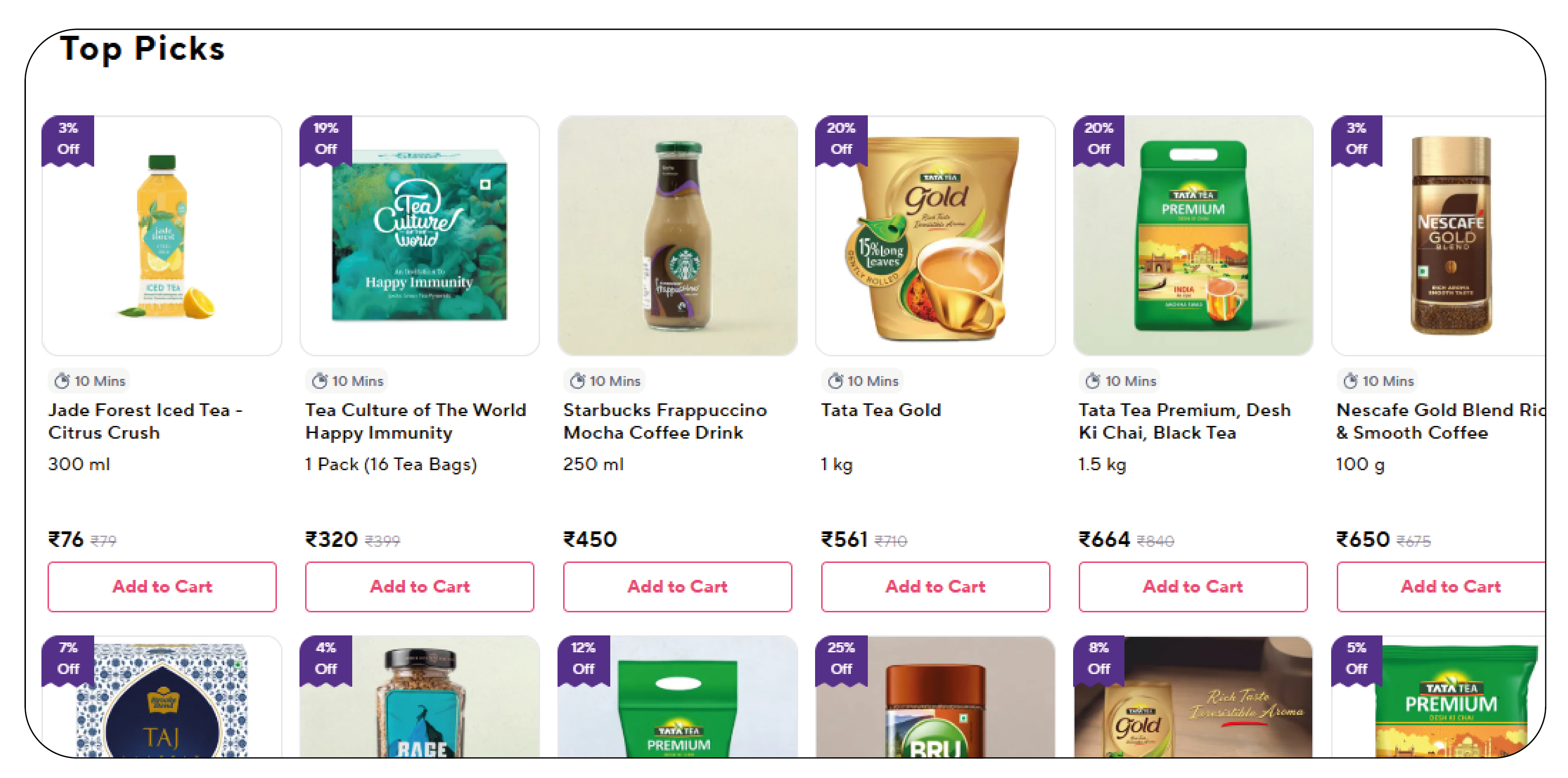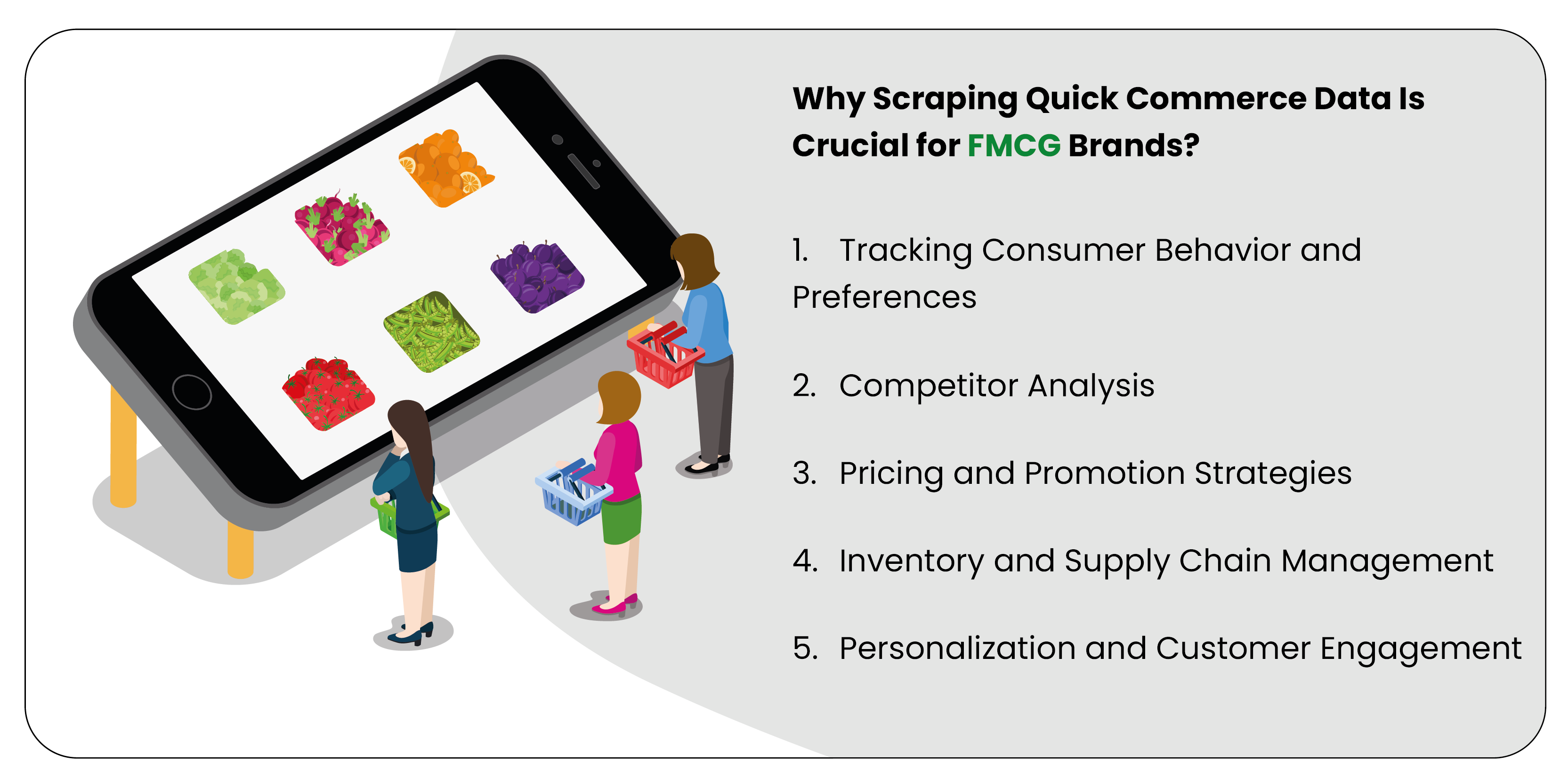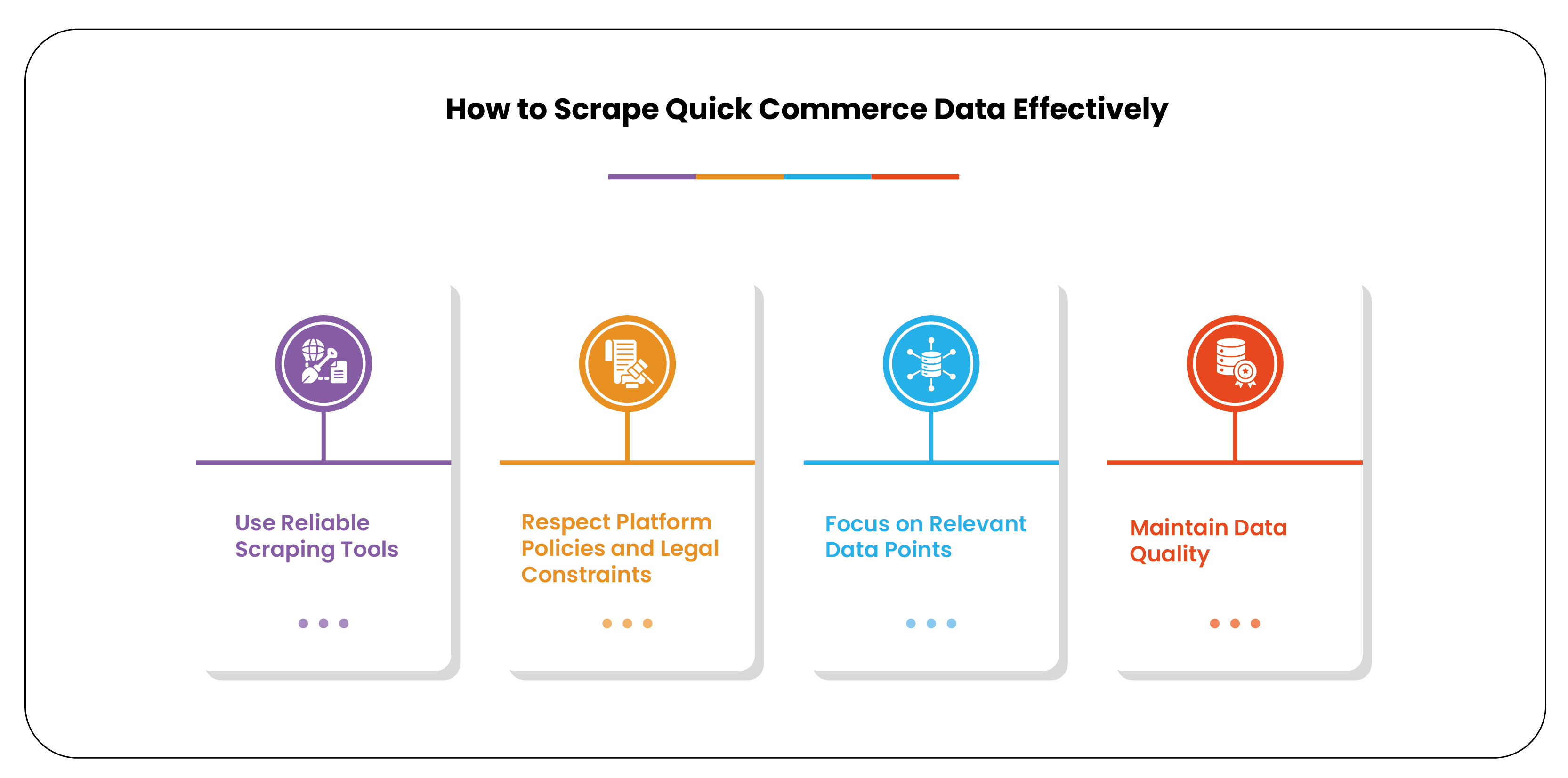
Introduction
In recent years, quick commerce and FMCG delivery trends in India have witnessed a meteoric
rise. This revolutionary business model has altered how consumers access and purchase fast-
moving consumer goods (FMCG). With platforms like Blinkit, Zepto, Grofers (now part of
Blinkit), and other online grocery delivery services gaining immense traction, the demand for
instant product delivery has become a primary feature of the Indian retail ecosystem. The role
of scraping quick commerce and FMCG delivery trends in India is changing how these products
are sold, consumed, and delivered.
However, the ability to stay ahead of the competition, predict customer preferences, and
optimize operations hinges on one crucial element: data. More specifically, FMCG quick
commerce data analytics in India is fast emerging as a game-changing tool for revolutionizing
FMCG trends in India. This article delves into how scraping quick commerce data can help
FMCG brands and retailers stay relevant in an evolving market and revolutionize trends in the
industry.
Understanding Quick Commerce and Its Impact on FMCG Trends

Quick commerce, or Q-commerce, refers to the fast delivery of consumer goods, often within
30 minutes or less. The rapid expansion of this service model in India is fueled by increasing
smartphone penetration, the adoption of e-commerce, and shifting consumer expectations.
Customers today want everything—groceries, household products, and snacks—delivered to
their doorsteps with minimal delay.
Quick commerce trends in FMCG delivery India have reshaped the retail landscape, driving the
demand for more efficient and immediate product delivery. FMCG products, typically
categorized as goods with a high turnover and low cost, such as food, beverages, personal care
products, and household items, have been significantly impacted by the rise of Q-commerce. As
consumers continue to prioritize convenience and immediacy, quick commerce platforms have
redefined the traditional way FMCG goods are distributed.
These platforms rely on cutting-edge technology to manage vast inventories, track demand
patterns, optimize logistics, and provide an efficient customer experience. However, what sets
successful players apart is their ability to use data—especially real-time data extracted through
web scraping grocery delivery data. By analyzing such data, companies can better understand
consumer preferences, monitor competitor activities, and improve supply chain management.
Moreover, grocery pricing data intelligence plays a pivotal role in adjusting pricing strategies
and offering competitive deals to customers, ensuring both profitability and customer
satisfaction.
Why Scraping Quick Commerce Data Is Crucial for FMCG Brands?

Data scraping is extracting large volumes of data from websites, apps, or other digital platforms
for analysis and actionable insights. For the quick commerce ecosystem, scraping data can
gather valuable insights into consumer preferences, product availability, pricing trends, and
competitive positioning. Here's how data scraping can help FMCG brands revolutionize their
strategies:
1. Tracking Consumer Behavior and Preferences
Scraping quick commerce data enables FMCG brands to better understand consumer
behavior. By collecting data from multiple Q-commerce platforms, companies can track
which products are trending, which brands are gaining popularity, and how preferences
shift over time. This real-time data can forecast demand, optimize product offerings,
and create targeted marketing strategies that align with consumer preferences.
For example, by analyzing product search frequencies, buying patterns, and customer reviews,
FMCG companies can identify specific needs or gaps in the market. Whether it's a surge in
demand for organic products, vegan food, or health-conscious beverages, brands can swiftly
adapt their product portfolios to meet these demands, ensuring they are always in tune with
the market. Additionally, Supermarket data scraping services can help brands gather
comprehensive data across platforms, enhancing their ability to predict consumer needs and
plan for future demand shifts.
2. Competitor Analysis
Competition in the FMCG sector is fierce, with both established brands and emerging
startups vying for the attention of Indian consumers. Data scraping can be invaluable for
understanding competitors' pricing strategies, product offerings, and promotional
activities. By analyzing competitor data from Q-commerce platforms, FMCG companies
can assess their market share, identify competitive threats, and stay ahead of the curve.
For example, scraping data from competing platforms like Blinkit and Zepto can provide
valuable insights into which FMCG products are in demand, which discounts or promotions are
most effective, and what delivery times or customer service strategies resonate with
consumers. This intelligence can inform decisions on pricing, inventory management, and
marketing campaigns, ensuring a competitive edge. Extract grocery & gourmet food data to
allow companies to understand specific product categories' performance on competitor
platforms, further refining competitive strategies.
3. Pricing and Promotion Strategies
Pricing plays a critical role in the success of FMCG products, especially in a price-
sensitive market like India. Quick commerce platforms operate on thin margins and
often use dynamic pricing models based on demand fluctuations, stock availability, and
competitor pricing. Scraping quick commerce data helps FMCG brands gain insights into
the price ranges of their products and competitors, enabling them to adjust their pricing
strategies accordingly.
Additionally, data scraping can provide valuable information about ongoing promotions and
discounts. FMCG brands can analyze how discounts, offers, and bundling impact sales, helping
them design more effective promotional campaigns that boost customer loyalty and sales.
Companies can track promotional activities by utilizing Web scraping grocery & gourmet food
data, ensuring they remain competitive in an increasingly saturated market.
4. Inventory and Supply Chain Management
Adequate inventory and supply chain management are critical for FMCG brands to
ensure their products are readily available on quick commerce platforms. Data scraping
helps companies understand stock levels, demand cycles, and product replenishment
trends on different platforms. By scraping data from Q-commerce apps, companies can
forecast which products will experience high demand and adjust their inventory
accordingly.
For instance, if a particular type of shampoo sees a surge in sales during the festive season,
scraping data can help forecast future demand, allowing brands to stock up on the product and
avoid shortages. This can minimize stockouts, improve customer satisfaction, and enhance the
overall efficiency of the supply chain. Through eCommerce dataset scraping, brands can access
timely insights into market demand, ensuring their inventory is optimized for real-time sales
trends.
5. Personalization and Customer Engagement
Personalized experiences are becoming increasingly important in the FMCG sector, and
data scraping is crucial in delivering them. FMCG brands can understand individual
customer preferences, purchase histories, and browsing behavior by scraping data from
consumer interactions on quick commerce platforms. This data can be used to offer
tailored recommendations, personalized discounts, and targeted advertising, enhancing
customer loyalty and increasing conversion rates.
For example, scraping data on frequently bought products or time-of-day purchases can help
FMCG brands suggest complementary items or bundle offers that increase average order value
and customer retention. Personalization through data-driven insights can significantly enhance
the consumer experience and foster long-term customer relationships. By leveraging Web
scraping quick commerce data, brands can create personalized strategies that drive repeat
business and customer satisfaction, ensuring they remain at the forefront of the market.
How to Scrape Quick Commerce Data Effectively?

While data scraping offers significant benefits, doing so ethically and effectively is essential.
Below are a few key considerations for FMCG companies looking to scrape quick commerce
data:
1. Use Reliable Scraping Tools: The first step in scraping quick commerce data is selecting the right tools and technologies. Various web scraping tools, like Scrapy, BeautifulSoup, Selenium, or browser automation software, can extract data from Q-commerce platforms. These tools help automate the data collection, ensuring the information gathered is accurate, comprehensive, and up-to-date.
2. Respect Platform Policies and Legal Constraints: When scraping data from quick commerce platforms, it is essential to comply with legal and ethical guidelines. Many platforms have terms of service that restrict the scraping of their data or may require permission to access specific datasets. To avoid legal complications, companies should ensure they are not violating these terms and always obtain the necessary permissions.
3. Focus on Relevant Data Points: FMCG brands should collect the most relevant data points to ensure the effective use of scraped data. This includes product details (e.g., SKU, price, availability), customer reviews, order histories, and stock levels. Companies can derive actionable insights that directly influence business operations by focusing on key data sets, from inventory management to marketing.
4. Maintain Data Quality: The accuracy and quality of the data scraped are critical for making informed decisions. Monitoring the quality of the scraped data regularly and cleaning up any inconsistencies or errors is essential. Tools like Python-based libraries (Pandas, NumPy) can cleanse and structure the data for further analysis.
Conclusion
Scraping quick commerce data is an invaluable tool for FMCG brands to stay competitive in India's fast-paced Q-commerce market. Companies can refine their strategies and improve operations by gaining real-time insights into consumer behavior, competitor actions, pricing, inventory, and preferences.
As quick commerce reshapes the retail landscape, brands embracing data-driven approaches will lead the way. Scraping data enables FMCG companies to predict trends, optimize logistics, and deliver superior customer experiences. Utilizing Grocery & Supermarket Data Scraping Services helps brands stay aligned with market demands and improve supply chain efficiency. The future of FMCG in India lies in data, and the brands that harness its power will thrive in the evolving world of quick commerce.
At Product Data Scrape, we strongly emphasize ethical practices across all our services, including Competitor Price Monitoring and Mobile App Data Scraping. Our commitment to transparency and integrity is at the heart of everything we do. With a global presence and a focus on personalized solutions, we aim to exceed client expectations and drive success in data analytics. Our dedication to ethical principles ensures that our operations are both responsible and effective.



















.webp)




.webp)
.webp)
